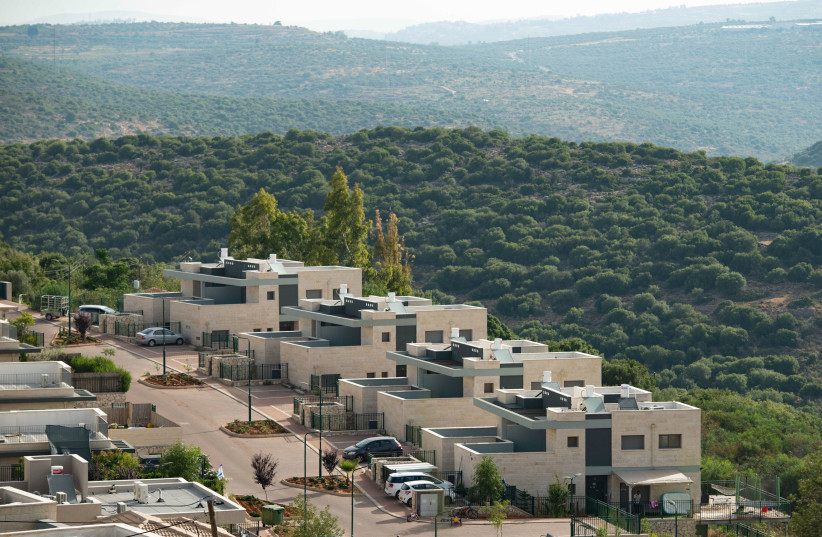The Biden administration has put the issue of settlements on the same level as the Iranian nuclear threat in its discussions with Israeli officials, multiple Israeli diplomatic sources said in recent days.
“The Americans bring up ‘settler violence’ all the time, obsessively,” a senior diplomatic source in Jerusalem lamented.
When Defense Minister Benny Gantz was in Washington last week to implore the Americans to take a tougher stance against the Iranian nuclear threat, US Secretary of State Antony Blinken insisted they devote equal time to discussing settlements as they did to Iran, which Israeli diplomatic sources found baffling.
Blinken told Gantz that the Israeli government’s settlement activity is “destroying the chance of a two-state solution.”
Another Israeli source involved in Gantz's visit to Washington said the description of the meeting is "inaccurate and the meeting with the secretary of state was friendly and mostly dealt with the Iranian matter.
"Other topics, such as the Palestinian issue, were discussed but were not the focus of the meeting," the source added.
Gantz’s meetings with US Secretary of Defense Lloyd Austin went more smoothly, the sources said. US National Security Advisor Jake Sullivan is coming to Israel next Wednesday to discuss Iran.

Talk of the American “obsession” came after Public Security Minister Omer Bar Lev came under fire from Prime Minister Naftali Bennett and others on the Right for speaking of settler violence with Under Secretary of State for Political Affairs Victoria Nuland, making no mention of Palestinian attacks on Israelis.
Bar Lev tweeted a photo of his meeting with Nuland, explaining that she was "interested, among other things, in settler violence and a way to reduce regional tensions and strengthen the Palestinian Authority."
A senior diplomatic source in Jerusalem said the violence is a real problem, but took issue with the proportion it has taken in discussions with the Americans, and with the label “settler violence.”
“We need to solve the problem. It’s serious. But the Americans keep pushing, and it’s not helpful,” the source said.
Defense Minister Gantz’s office claimed in response to the Jerusalem Post report that “the meeting with Secretary Blinken was positive and productive. The dialogue focused primarily on regional challenges with Iran at the top of the agenda.”
Jerusalem also views specific violent incidents by settlers as a law enforcement problem, while a nuclear Iran is an existential threat to Israel, which is why diplomatic sources were baffled by Blinken’s priorities in the meeting with Gantz.
Gantz and Mossad chief David Barnea traveled to Washington separately last week to talk about Iran with top US officials.
Meanwhile, negotiations between world powers and Iran have continued in Vienna, for Washington and Tehran to return to the 2015 Joint Comprehensive Plan of Action nuclear deal.
Senior European diplomats in Vienna briefed reporters on Monday night that "as of this moment, we still have not been able to get down to real negotiations."
"We are wasting precious time dealing with new Iranian positions inconsistent with the JCPOA or that go beyond it," the diplomats said. "Time is running out. Without swift progress, in light of Iran’s fast-forwarding of its nuclear program, the JCPOA will very soon become an empty shell."
Iran's top nuclear negotiator, Ali Bagheri Kani, responded on Twitter by saying: "Some actors persist in their blame game habit, instead of real diplomacy. We proposed our ideas early, and worked constructively and flexibly to narrow gaps."
Referring to the United States and its withdrawal from the nuclear pact in 2018, Kani wrote: "Diplomacy is a two-way street. If there's a real will to remedy the culprit's wrongdoing, the way for a quick, good deal will be paved."
Russian Ambassador to International Organizations in Vienna Mikhail Ulyanov, however, took a more optimistic approach, telling Russian state media TASS that "the process is progressing. Not too fast, but still, it is moving forward."
The main issue, Ulyanov said, is whether to destroy advanced centrifuges, transfer them out of Iran, or seal them off with International Atomic Energy Agency guarantees.
Blinken said on Tuesday that Washington continues to pursue diplomacy with Iran because "it remains, at this moment, the best option," but added that it was "actively engaging with allies and partners on alternatives."
Reuters and Tovah Lazaroff contributed to this report.
